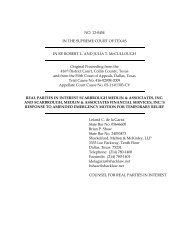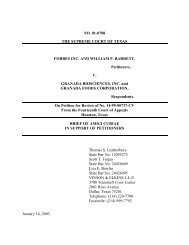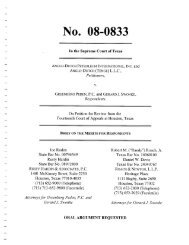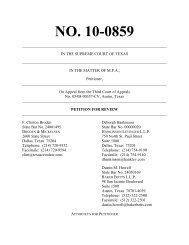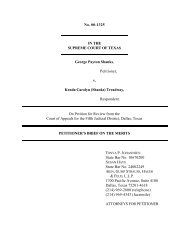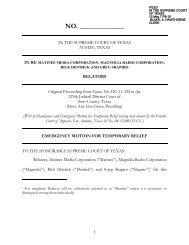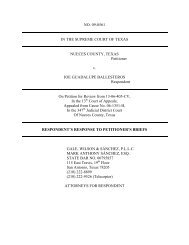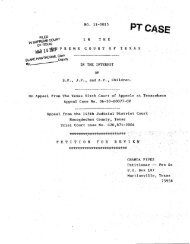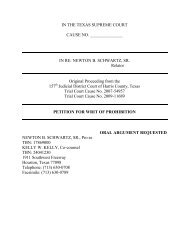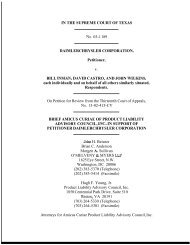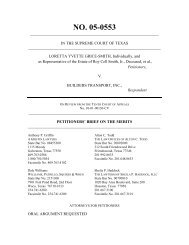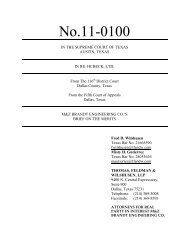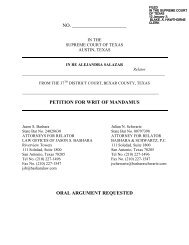Petition for Writ of Mandamus - Filed - Supreme Court of Texas
Petition for Writ of Mandamus - Filed - Supreme Court of Texas
Petition for Writ of Mandamus - Filed - Supreme Court of Texas
Create successful ePaper yourself
Turn your PDF publications into a flip-book with our unique Google optimized e-Paper software.
<strong>Texas</strong> Comptroller <strong>of</strong> Public Accounts<br />
May 11,2012<br />
Page 4<br />
II.<br />
The Margin Tax Violates the Equal Protection Clause <strong>of</strong> the United States<br />
Constitution.<br />
The Equal Protection Clause commands that no state shall "deny to any person within its<br />
jurisdiction the equal protection <strong>of</strong> the laws." U.S. CONST. amend. XIV, § 1. It <strong>for</strong>bids a state<br />
from treating differently persons who are in all relevant respects alike. Nordlinger v. Hahn, 505<br />
U.S. 1, 10 (1992). With regard to state taxation, the Equal Protection Clause <strong>for</strong>bids disparate<br />
treatment <strong>of</strong> taxpayers that has no rational basis or that is palpably arbitrary. Allied Stores <strong>of</strong><br />
Ohio v. Bowers, 358 U.S. 522, 527 (1959). Any disparate treatment must rest upon some<br />
ground or difference having a fair and substantial relation to the object <strong>of</strong> the legislation. Id.<br />
The relationship <strong>of</strong> the classification to its goal must not be so attenuated as to render the<br />
distinction arbitrary or irrational. Nordlinger, 505 U.S. at 11.<br />
Thus, pursuant to the Equal Protection Clause, the Margin Tax may not treat differently<br />
persons who are in all relevant respects alike. Any classifications imposed by the Margin Tax<br />
must have a rational basis and must be fairly and substantially related to the object <strong>of</strong> the<br />
tax—to tax the value <strong>of</strong> the Privilege. See Nat'l Bancshares Corp, 584 S.W.2d at 270; Gen.<br />
Dynamics Corp., 547 S.W.2d at 257-58; Rylander v. Fisher Controls Intl, 45 S.W.3d 291, 293<br />
(Tex. App.—Austin 2001, no pet.).<br />
As detailed above, each step <strong>of</strong> the Margin Tax calculation is fraught with arbitrary<br />
disparities among similarly-situated taxpayers. First, the calculation <strong>of</strong> Total Revenue permits<br />
certain arbitrary exclusions <strong>for</strong> taxpayers in certain industries but not <strong>for</strong> other taxpayers in other<br />
industries. There does not appear to be any rational basis <strong>for</strong> treating these taxpayers<br />
differently from one another, and the disparate treatment certainly does not have a fair or<br />
substantial relation to the Privilege being taxed.<br />
Further, the different types <strong>of</strong> deductions subtracted from Total Revenue—COGS,<br />
compensation, or 30% <strong>of</strong> Total Revenue—and the uni<strong>for</strong>m deduction requirement <strong>for</strong> all<br />
taxpayers within a combined group create arbitrary distinctions among taxpayers, and the<br />
differences within the calculations <strong>of</strong> these deductions exacerbate the disparities between<br />
similarly-situated taxpayers. The COGS deduction allows only certain taxpayers to deduct<br />
certain costs <strong>of</strong> business. For example, a taxpayer that sells tangible personal property may<br />
deduct the direct costs <strong>of</strong> acquiring or producing the goods, some indirect costs, and up to 4%<br />
<strong>of</strong> overhead and administrative costs; however a taxpayer that leases the same tangible<br />
personal property may not deduct any such costs unless one <strong>of</strong> four narrow exceptions applies.<br />
See id. § 171.1012. Not only are sellers treated differently than lessors, but lessors are treated<br />
differently than similarly-situated lessors via four narrow exceptions <strong>for</strong> lending institutions,<br />
lessors <strong>of</strong> motor vehicles, lessors <strong>of</strong> heavy construction equipment, and lessors <strong>of</strong> rolling stock.<br />
See id. § 171.1012(k), (k-1).<br />
The calculation <strong>of</strong> compensation also creates distinctions with no rational basis. For no<br />
apparent reason related to the value <strong>of</strong> the Privilege, the Margin Tax allows a company to<br />
O - • O • • • TY . • - s pal• o an emp oyee, •u •oes no a ow a semi arty-situated<br />
company to deduct amounts paid to an independent contractor. See id. § 171.1013. It also<br />
arbitrarily distinguishes between employee salaries <strong>of</strong> $300,000 or less and employee salaries<br />
in excess <strong>of</strong> $300,000 because the salary amount is unrelated to the value <strong>of</strong> the Privilege. See<br />
id. § 171.1013(c)<br />
AUSTIN I \661403 vl 52275-1



